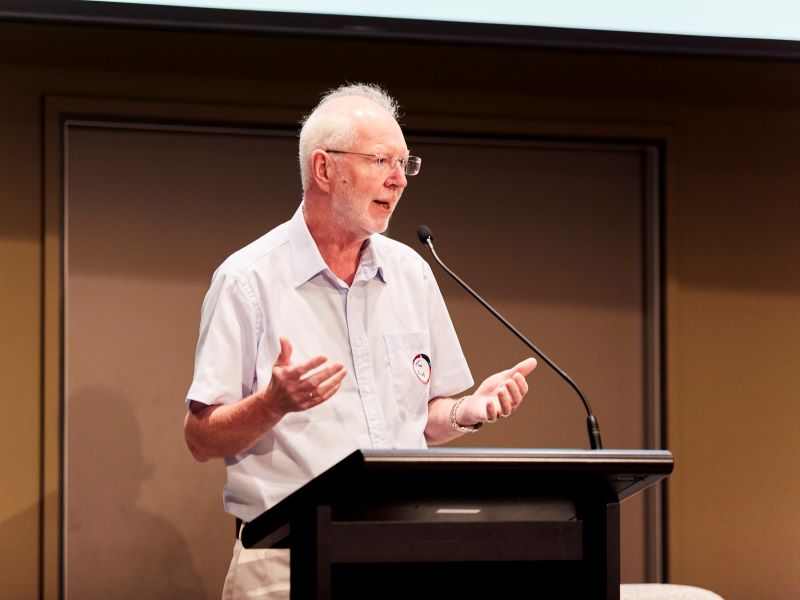The Albanese government’s move to tax super funds’ unrealised gains will lead to investors pulling out of or avoiding high growth assets like startups and deep technology companies, Australia’s top angel investor is warning.
“I think people have not yet realised what impact this is going to have. And it’s going to have such a negative impact on the innovation sector in Australia,” Professor Tim Hirst told InnovationAus.com on the sidelines of the Southstart startup and innovation festival.
“People will start to say, ‘actually, I won’t use my resources to invest in high growth assets because of the tax liability’. And what that would do is pull money out of this very system that we’re here to talk about — how do you get private investors and angel investors to back fascinating, innovative technologies.”
The Treasurer has downplayed the risk, saying super funds will still have access to concessional rates and should have liquid assets to meet additional tax liabilities.

Professor Tim Hirst is a 15-year veteran of angel investing, having backed many Australian biotech and medtech founders. He took up angel investing after an academic career that included leading research and innovation at the University of Sydney and the ANU’s $30 million pre-seed investment fund.
Now the chief executive of unlisted biotech GPN Vaccines, he’s raising the alarm on the tax treatment of unrealised gains and losses in superannuation funds that is part of Treasurer Jim Chalmers’ plan to crack down on generous superannuation tax concessions.
While the plan will only directly impact a tiny portion of the population and has majority support of the public, its calculation method may have unintended consequences, Professor Hirst said.
Treasury’s plan to calculate super funds’ earnings in a financial year includes “all notional (unrealised) gains and losses”.
“It’s almost a unique situation where things that could ultimately never deliver a return you’re paying tax on. And I think that’s something we need to call out,” Professor Hirst said.
Earnings will be calculated with reference to the difference in total superannuation balance at the start and end of the financial years, adjusting for withdrawals and contributions. The government sees it as the simplest, least cost approach to applying the proposed changes.
But the move, which may yet change through the government’s consultation before finalising the reform and won’t begin until 2025, sets a worrying precedent and will hurt innovation in Australia, Professor Hirst said.
He said it would disincentivise self managed super funds from backing deep technology companies that may not reach an exit opportunity for more than a decade because the investor may have to pay tax each year without any guarantees of a return.
“The reality is that for a lot of angel investors, it was convenient to use a self managed super fund as the vehicle to make those private investments,” he said.
Professor Hirst said the change also appears to apply to industry super funds, an “even worse” outcome for Australian innovation because it would also discourage the massive funds from backing high growth opportunities.
“Industry superfunds which are also investing in alternative assets with high growth potential will be disincentivised to do so. By definition, such investments are designed to grow in value. But now there’s a lot of risk, because of tax on unrealised gains.
“This is totally counterproductive. This is actually sending exactly the wrong message to the super funds about what they should be investing in. [It says] ‘don’t invest in high growth, assets. Invest in other things, certainly not a long term play where you might never realize an asset for 10 or 20 years.”
A spokesperson for the Treasurer downplayed the concern.
“Investors will still have access to concessional tax rates,” the spokesperson told InnovationAus.com
“There is nothing to suggest our modest changes to tax breaks for super balances above $3 million would have impact in this regard.
“This modest adjustment means 99.5 per cent of Australians with super accounts will keep earning the same generous tax breaks, and 0.5 per cent of people with balances above $3 million will receive less generous tax breaks.
“Under prudential requirements, all superannuation funds are required to consider diversification and liquidity when making investments. If funds are doing this, then they should have some liquid assets to meet additional tax liabilities.”
Joseph Brookes travelled to Southstart as a guest of the event.
Do you know more? Contact James Riley via Email.


The point that only 0.5% will be affected by these changes is disingenuous.It compares 20yo’s with 6 months super with 65yo’s with 40 years super.It is a highly deceptive number, even if factually true. From the latest Tax Office bulletin on SMSF’s, 27% of funds in retirement phase have balances above $2m (there is no figure given for funds above $3m).